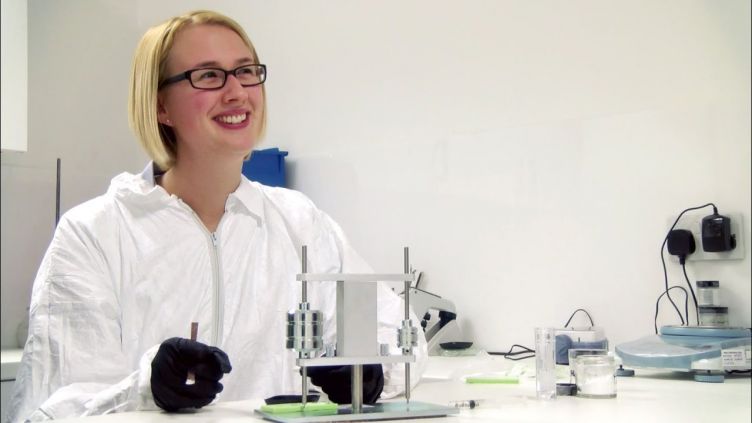Ceramisys
Ceramisys are a Sheffield based SME who specialise in the development and manufacturing of synthetic bone graft substitutes for the repair and regeneration of bone. They have been working in partnership with the University since 2002 through PhD studentships and collaborative research.
The benefits of working with the University of Sheffield
Wayne Austin, Managing Director, and Dr Becci Goodchild, Research Manager, are in no doubt about the role that the University of Sheffield is playing in the development of Ceramisys.
"From the very early days," said Wayne, "Professor Paul Hatton and his team in the Dental School were my virtual R&D laboratory. Without them, I couldn't have done all the testing and got the feedback I needed to develop the products.
"Ever since, the relationship has been mutually beneficial. We have supported the funding of PhD students, and we have been an industrial partner with the University in seeking European and other grant funding."
Becci added, "Most of what we do with the University is grant funded – it's quite a cost-effective way of doing early-stage projects and de-risking the technologies for us to take them forward. We can guide the project through with a commercial idea in mind.
"We've had some things that we weren't sure how successful they would be and are now looking really, really promising. We wouldn't have started them on our own. We've got the trust to bounce ideas around - to see if it's worth taking projects forward."
It's not just about the academics, whole teams at the University support academics and their collaborators in putting together bids and finding partners.
Dr Becci Goodchild
Research Manager
"Academics are more approachable than perhaps people perceive them to be," commented Wayne. "They want to do research and work on new products. They know the funding schemes, and do most of the writing for applications.
"Supporting PhD students means we also have access to several academics' knowledge – not just the PhD student, but academic supervisors and faculty backing. They will help us explore other departments if the expertise is elsewhere."
Becci added, "Also, it's not just about the academics. Whole teams at the University support academics and their collaborators in putting together bids and finding partners. And the more grants you go for, the easier the writing gets. Any SME has to invest time in developing a relationship with the University.
"Your project or idea has to be something you really want to take forward. Go to Open Days, find the academics working in your area, access the For Business section of the University's website, get on the phone, write emails. Our local University has so much to offer."
The story so far
Wayne Austin and Professor Paul Hatton began to work together using small grants to fund scientific and technical support. This collaboration developed so that Ceramisys were confident enough to apply for their first CASE PhD studentship in 2006. The Engineering and Physical Sciences Research Council (EPSRC) provided the funding to allow the business to arrange a PhD with an academic partner of their choice.
This successful partnership led, in 2008, to Ceramisys and the University applying for funding for Nano4Med, a Technology Strategy Board (now Innovate UK) co-sponsored project which involved researchers from several academic departments – and is where Wayne met Becci, who was a Post-Doctoral Research Assistant at the time.
The Dental School does not only include experts in the basic sciences and bioengineering that could help collaborators innovation processes and product development, but we also have leading researchers in the development of tools for patient-centred research, and some of the world's leading clinicians who can provide unique insights into prototype design and product performance.
Professor Paul Hatton
Director of Research
Another CASE PhD studentship started in 2011 with Caroline Wilcock who also took part in the HEFCE Catalyst Placement Scheme, spending time at Ceramisys. She is now a Post-Doctoral Research Assistant working on a joint project between Ceramisys and the University of Sheffield.
Becci explained, "The PhD students settle in really well. They've got the understanding of the laboratory, risks and issues surrounding confidentiality. Everything like that is part of their training at the University. Caroline is now developing her PhD research, and we definitely hope to have a product from this work."
The IMCOSS project started in 2012, led by Ceramisys and the University. This consortium comprised of three leading SMEs from Europe and two research institutions from the UK and Austria. They received European funding aimed at helping SMEs develop potential products.
A third CASE PhD student, Joss Atkinson, started in 2013 and has also been successful in gaining HEFCE Catalyst funding. He undertook a joint placement with Ceramisys and Sheffield-based SME JRI Orthopaedics in 2015; there are plans to commercialise the resulting product.
Wayne concluded, "We are constantly innovating to grow and develop. Colleagues in our industry are impressed by the relationship that we have developed with the University of Sheffield. It shows we are open to collaboration."

